| Listing 1 - 10 of 37 | << page >> |
Sort by
|
Book
ISBN: 0674267249 0674043456 9780674043459 Year: 2005 Publisher: Cambridge, Mass. ; London : Harvard University Press,
Abstract | Keywords | Export | Availability | Bookmark
 Loading...
Loading...Choose an application
- Reference Manager
- EndNote
- RefWorks (Direct export to RefWorks)
Rebecca's Revival is the remarkable story of a Caribbean woman--a slave turned evangelist--who helped inspire the rise of black Christianity in the Atlantic world. All but unknown today, Rebecca Protten left an enduring influence on African-American religion and society. Born in 1718, Protten had a childhood conversion experience, gained her freedom from bondage, and joined a group of German proselytizers from the Moravian Church. She embarked on an itinerant mission, preaching to hundreds of the enslaved Africans of St. Thomas, a Danish sugar colony in the West Indies. Laboring in obscurity and weathering persecution from hostile planters, Protten and other black preachers created the earliest African Protestant congregation in the Americas. Protten's eventful life--the recruiting of converts, an interracial marriage, a trial on charges of blasphemy and inciting of slaves, travels to Germany and West Africa--placed her on the cusp of an emerging international Afro-Atlantic evangelicalism. Her career provides a unique lens on this prophetic movement that would soon sweep through the slave quarters of the Caribbean and North America, radically transforming African-American culture. Jon Sensbach has pieced together this forgotten life of a black visionary from German, Danish, and Dutch records, including letters in Protten's own hand, to create an astounding tale of one woman's freedom amidst the slave trade. Protten's life, with its evangelical efforts on three continents, reveals the dynamic relations of the Atlantic world and affords great insight into the ways black Christianity developed in the New World.
African American evangelists --- African American women --- Protten, Rebecca, --- Afro-American evangelists --- Evangelists, African American --- Evangelists
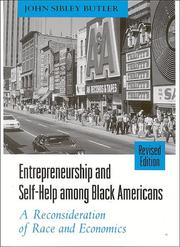
ISBN: 0791486044 142374859X 9781423748595 0791458938 9780791458938 0791458946 9780791458945 9780791486047 9780791486047 Year: 2005 Publisher: Albany State University of New York Press
Abstract | Keywords | Export | Availability | Bookmark
 Loading...
Loading...Choose an application
- Reference Manager
- EndNote
- RefWorks (Direct export to RefWorks)
Since its publication in 1991, Entrepreneurship and Self-Help among Black Americans has become a classic work, influencing the study of entrepreneurship and, more importantly, revitalizing a research tradition that places new ventures at the very center of success for black Americans. This revised edition updates and enhances the work by bringing it into the twenty-first century. John Sibley Butler traces the development of black enterprises and other community organizations among black Americans from before the Civil War to the present. He compares these efforts to other strong traditions of self-help among groups such as Japanese Americans, Jewish Americans, Greek Americans, and exciting new research on the Amish and the Pakistani. He also explores how higher education is already a valued tradition among black self-help groups—such that today their offspring are more likely to be third and fourth generation college graduates. Butler effectively challenges the myth that nothing can be done to salvage America's underclass without a massive infusion of public dollars, and offers a fresh perspective on those community based organizations and individuals who act to solve local social and economic problems.
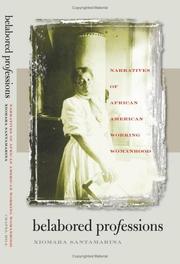
ISBN: 080787700X 9780807877005 0807829811 9780807829813 0807856487 9780807856482 9798890879110 Year: 2005 Publisher: Chapel Hill University of North Carolina Press
Abstract | Keywords | Export | Availability | Bookmark
 Loading...
Loading...Choose an application
- Reference Manager
- EndNote
- RefWorks (Direct export to RefWorks)
According to nineteenth-century racial uplift ideology, African American women served their race best as reformers and activists, or as "doers of the word." This book examines the autobiographies of four women who diverged from that ideal and defended the legitimacy of their self-supporting wage labor.
American prose literature --- Women and literature --- African American women --- African American women in the professions --- Narration (Rhetoric) --- Autobiography --- African American women in literature. --- Autobiography of women --- Women's autobiography --- Afro-American women in literature --- African American autobiography --- Autobiography of African Americans --- Afro-American women --- Women, African American --- Women, Negro --- Women --- Afro-American women in the professions --- Professions --- African American authors --- History and criticism. --- Women authors --- History --- Intellectual life --- History. --- Employment --- African American authors. --- Women authors. --- Afro-American authors --- Rhetoric --- Discourse analysis, Narrative --- Narratees (Rhetoric)
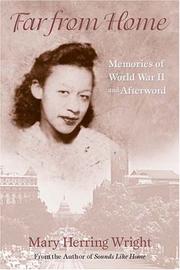
ISBN: 1563683296 9781563683299 9781563683190 1563683199 1563683199 Year: 2005 Publisher: Washington, D.C. Gallaudet University Press
Abstract | Keywords | Export | Availability | Bookmark
 Loading...
Loading...Choose an application
- Reference Manager
- EndNote
- RefWorks (Direct export to RefWorks)
African American women --- Deaf women --- Afro-American women --- Women, African American --- Women, Negro --- Women --- Women, Deaf --- Women with disabilities --- Wright, Mary Herring, --- Herring, Mary,
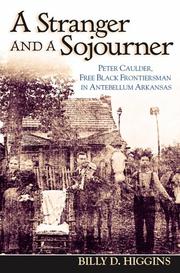
ISBN: 1610754069 9781610754064 1557288054 9781557288059 Year: 2005 Publisher: Fayetteville
Abstract | Keywords | Export | Availability | Bookmark
 Loading...
Loading...Choose an application
- Reference Manager
- EndNote
- RefWorks (Direct export to RefWorks)
Free African Americans --- African American pioneers --- Afro-American pioneers --- Pioneers, African American --- Pioneers --- Free Afro-Americans --- Free blacks --- African Americans --- History --- Caulder, Peter, --- Arkansas --- Free Black people
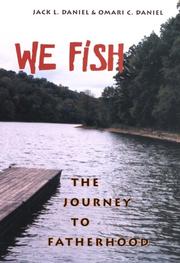
ISBN: 0822977834 0822958910 9780822977834 1306554381 9781306554381 9780822958918 9780822958918 Year: 2005 Publisher: Pittsburgh, Pa.
Abstract | Keywords | Export | Availability | Bookmark
 Loading...
Loading...Choose an application
- Reference Manager
- EndNote
- RefWorks (Direct export to RefWorks)
Annotation
African Americans --- African American fathers --- Fathers and sons --- African American men --- Role models --- Fishing --- Social aspects --- Daniel, Jack L. --- Daniel, Omari C. --- Family. --- Juniata River Valley (Pa.) --- Social life and customs. --- Angling --- Recreational fishing --- Sport fishing --- Sportfishing --- Models, Role --- Afro-American men --- Men, African American --- Afro-American fathers --- Fathers, African American --- Aquatic sports --- Wildlife-related recreation --- Fishes --- Persons --- Men --- Fathers

ISBN: 0099760118 Year: 2005 Publisher: London [etc.] Vintage
Abstract | Keywords | Export | Availability | Bookmark
 Loading...
Loading...Choose an application
- Reference Manager
- EndNote
- RefWorks (Direct export to RefWorks)
Afro-Americans --- Slavery --- Social conditions --- Fiction. --- History --- African American women --- Infanticide --- Women slaves --- Slave women --- Slaves --- Homicide --- Afro-American women --- Women, African American --- Women, Negro --- Women --- African Americans --- American literature --- Women, Enslaved --- Enslaved persons
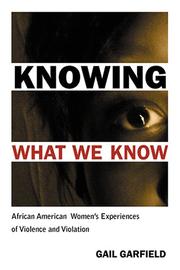
ISBN: 0813537592 0813536596 081353660X 9780813537597 9780813536590 9780813536606 0813580455 9780813580456 Year: 2005 Publisher: New Brunswick, N.J. Rutgers University Press
Abstract | Keywords | Export | Availability | Bookmark
 Loading...
Loading...Choose an application
- Reference Manager
- EndNote
- RefWorks (Direct export to RefWorks)
In recent years there has been an attempt by activists, service providers, and feminists to think about violence against women in more inclusive ways. In Knowing What We Know, activist and sociologist Gail Garfield argues that this effort has not gone far enough and that in order to understand violence, we must take the lived experiences of African American women seriously. Doing so, she cautions, goes far beyond simply adding voices of black women to existing academic and activist discourses, but rather, requires a radical shift in our knowledge of these women’s lives and the rhetoric used to describe them. Bringing together a series of life-history interviews with nine women, this unique study urges a departure from established approaches that position women as victims of exclusively male violence. Instead, Garfield explores what happens when women’s ability to make decisions and act upon those choices comes into conflict with cultural and social constraints. Chapters explore how women experience racialized or class-based violence, how these forms of violence are related to gendered violence, and what these violations mean to a woman’s sense of identity. By showing how women maintain, sustain, and in some instances regain their sense of human worth as a result of their experiences of violation, Garfield complicates the existing dialogue on violence against women in new and important ways.
African American women --- Violence against. --- Crimes against. --- Afro-American women --- Women, African American --- Women, Negro --- Women --- Interviews. --- Jordan, Barbara, --- Conversation --- Interviewing --- Jordan, Barbara Charline, --- African Americans --- Intellectual life. --- United States --- Civilization --- African American influences. --- African American intellectuals
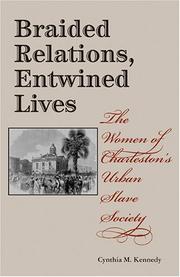
ISBN: 1282072498 9786612072499 0253111463 9780253111463 0253346150 9780253346155 Year: 2005 Publisher: Bloomington, IN Indiana University Press
Abstract | Keywords | Export | Availability | Bookmark
 Loading...
Loading...Choose an application
- Reference Manager
- EndNote
- RefWorks (Direct export to RefWorks)
""[A] stunning, deeply researched, and gracefully written social history."" -- Leslie Schwalm, University of Iowa This study of women in antebellum Charleston, South Carolina, looks at the roles of women in an urban slave society. Cynthia M. Kennedy takes up issues of gender, race, condition (slave or free), and class and examines the ways each contributed to conveying and replicating power. She analyses what it meant to be a woman in a world where historically specific social classifications
African American women --- Women --- Afro-American women --- Women, African American --- Women, Negro --- Human females --- Wimmin --- Woman --- Womon --- Womyn --- Females --- Human beings --- Femininity --- Social conditions. --- History. --- Charleston (S.C.) --- City of Charleston (S.C.) --- Charles-Town (S.C.) --- Race relations
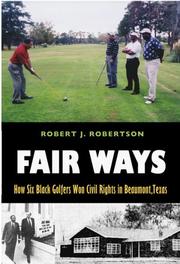
ISBN: 129905269X 1603446109 9781603446105 1585444421 9781585444427 Year: 2005 Publisher: College Station Texas A & M University Press
Abstract | Keywords | Export | Availability | Bookmark
 Loading...
Loading...Choose an application
- Reference Manager
- EndNote
- RefWorks (Direct export to RefWorks)
Discrimination in sports --- African American golfers --- Afro-American golfers --- Golfers, African American --- Golfers --- Integration in sports --- Race discrimination in sports --- Racial integration in sports --- Segregation in sports --- Sports --- Racism in sports --- Law and legislation --- History --- Civil rights
| Listing 1 - 10 of 37 | << page >> |
Sort by
|

 Search
Search Feedback
Feedback About UniCat
About UniCat  Help
Help News
News